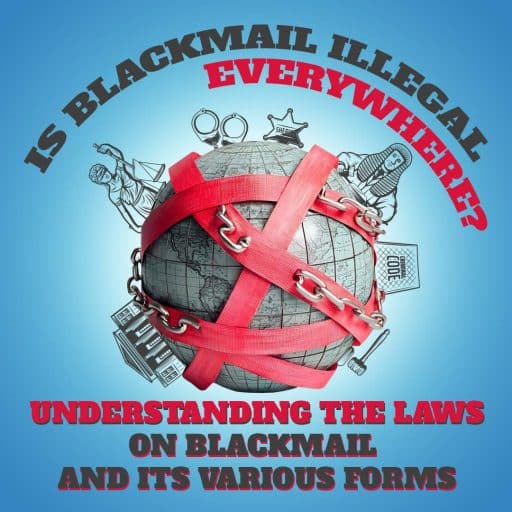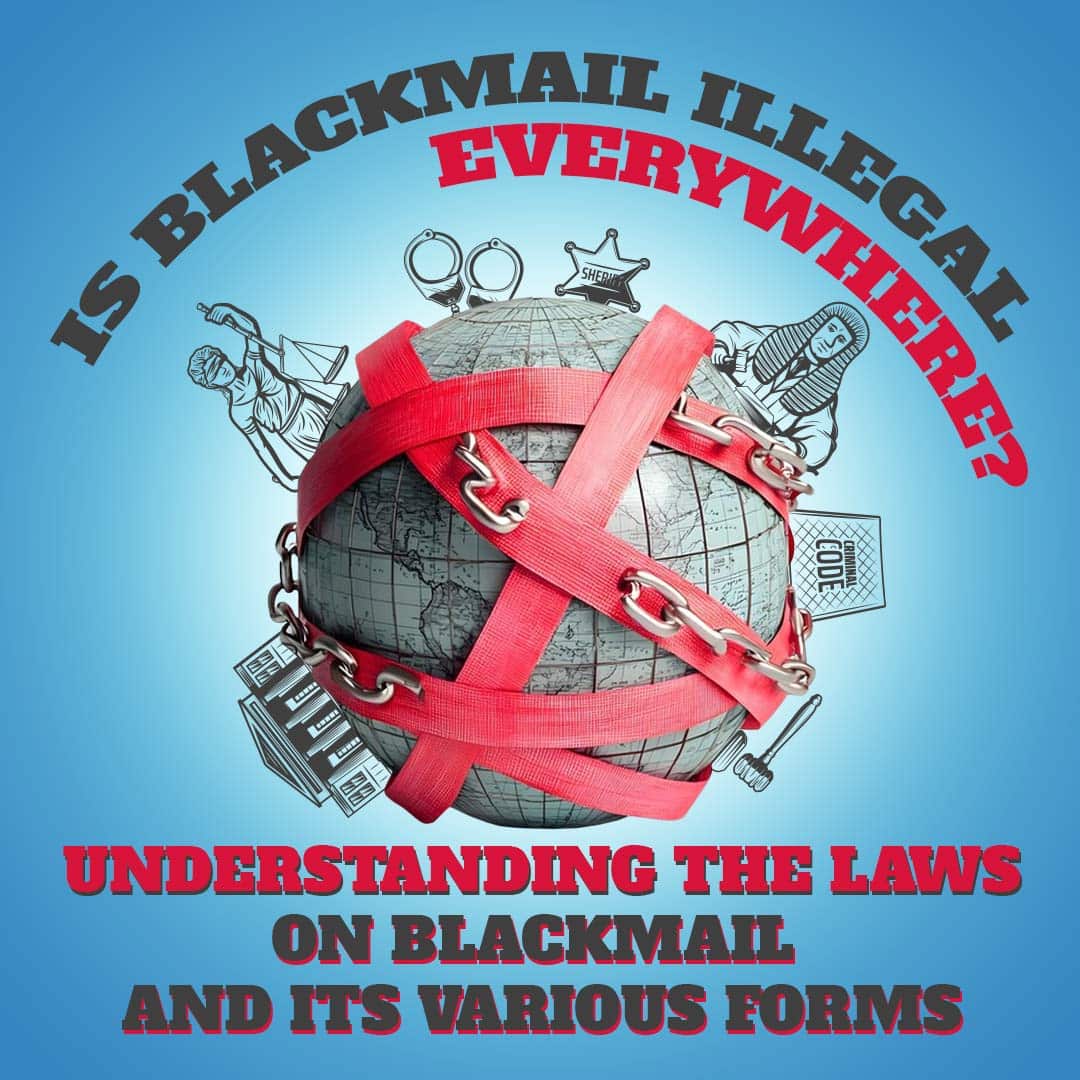The crime of blackmail is constantly evolving as criminals adapt to new technologies. With the rise of social media, digital communication, and online platforms, cyber blackmail has become an increasingly serious threat. While blackmail tactics of the past often required proximity to a victim’s location or social network, the digital age has introduced new capabilities for cybercriminals to target and connect with their victims, regardless of distance. These advancements have expanded the reach of blackmail, but in response, various organizations in cybersecurity and legal services have emerged to help combat this growing threat.
Is Blackmail Illegal?
Yes, blackmail and the various crimes that fall under its umbrella are considered illegal in most countries. However, this raises an important question: if the laws are clear, why are people still committing this crime on such a large scale?
Despite the criminalization and potential penalties, the growing use of digital platforms and social media have made it easier for these scammers to carry out different types of blackmail without facing immediate consequences. As more people share their lives online, they unknowingly place a target on themselves creating a higher risk of extortion.
The Three Main Types of Cyber Blackmail
While the definition of blackmail may vary depending on whom you ask, the most common definition describes it as a crime in which one individual threatens to release private information about another unless they are compensated financially. The key factor in these threats is the type of information used, which leads to the three main types of cyber blackmail:
- Sextortion: This type of blackmail involves a criminal threatening to release explicit images or videos featuring their victim. Regardless of how the blackmailer obtained the content, they typically threaten to share it with the victim’s friends, family, co-workers, or other social circles unless they receive financial compensation*.
- For more comprehensive information on the crime of sextortion, click here.
- Doxxing: In this type of blackmail, the perpetrator threatens to expose the victim’s personal, identifiable information. This may include their home address, phone numbers, email addresses, or even details about their workplace or their children’s school. The threat of doxxing can lead to harassment and other potentially harmful crimes.
- For more comprehensive information on the crime of doxxing, click here.
- Sensitive Information Leaking: This type of blackmail involves threats to release confidential or embarrassing information about the victim. This could include details of past crimes, medical history, or any other personal information not covered under sextortion or doxxing.
*Please note that the use of sexually explicit content to coerce a victim to perform other sexual acts or supply the blackmailer with additional content is defined as sexploitation. If you would like information on the differences between sextortion and sexploitation please click here.
How Is Blackmail Prosecuted in the U.S.A.?
Blackmail is a crime that can be prosecuted at both the federal and state levels in the United States, but how it’s handled may vary depending on the specific situation of the victim and the culprit. If you’re facing blackmail, it’s important to understand your legal options and seek the right support. Whether you need to work with local law enforcement or consult with an attorney, the following resources will help you take the next steps in addressing the situation and protecting your rights.
Federal Laws Concerning Blackmail
At the federal level of the United States, there are seven laws that list the crime of or actions involved in blackmail that make the act of blackmail illegal and a punishable offense in the United States.
- 18 U.S.C. § 873 – Blackmail: this law addresses blackmail in the traditional sense of the word, criminalizing the act of someone threating to expose damaging information unless their victim agrees to pay them.
- 18 U.S.C. § 1951 – The Hobbs Act: The Hobbs act criminalized many forms of extortion, a category of crime that blackmail falls under. Where extortion is different is that it can include threats of force, fear, or violence unless demands are met.
- 18 U.S.C. § 875 – Interstate Communications: This statute makes it illegal to use interstate or foreign communications to transmit any threats to harm or to extort someone for money. This applies to any communications through email, phone calls, text messages, social media messenger, or other forms of digital communication.
- 18 U.C. § 1030 – Computer Fraud and Abuse Act (CFAA): This law primarily applies to cases where a blackmailer obtains information through some form of unauthorized access to a victim’s computer to obtain the data, they will use to extort them.
- 18 U.S.C. § 2261A – Stalking & Cyberstalking: This statute pertains specifically to online stalking tied to the act of blackmail. Given the nature of the constant harassing messages that are a part of any blackmail scam, the act of cyberstalking is naturally added to the list of criminal charges.
- 18 U.S.C. § 2260B – Online Exploitation of Children: This law comes into play only if the victim is under the age of 18 and addresses crimes related to online exploitation ie: using the internet to entice, exploit, or abuse a child.
- 18 U.S.C. § 2252A – Child Pornography Offenses: This is another statute that specifically deals with children under the age of 18. This law solely applies to the act of sextortion as it requires a child to send some type of sexual content to the blackmailer which then classifies the act as child pornography.
State Laws Concerning Blackmail
While every state in the U.S.A. classifies the crime of blackmail a bit differently, all states have some version of laws criminalizing the three main types of blackmail. Below is a list for all 50 states and how they handle each of the three types of online blackmail.
- Alabama Blackmail Resources: Alabama has specific laws covering harassment and extortion.
- Alaska Blackmail Resources: Alaska prosecutes blackmailers under their laws against concerning digital harassment and extortion.
- Arizona Blackmail Resources: Arizona has statutes that criminalize extortion. For sextortion, they address this in their laws concerning the non-consensual distribution of intimate content.
- Arkansas Blackmail Resources: Arkansas has laws that criminalize extortion of any kind.
- California Blackmail Resources: California has general laws against extortion and blackmail and more specific laws pertaining to the distribution of intimate images without consent.
- Colorado Blackmail Resources: Colorado lists the different types of blackmail in its laws criminalizing cyber exploitation and extortion.
- Connecticut Blackmail Resources: Connecticut pursues legal action against any type of cyber extortion.
- Delaware Blackmail Resources: Delaware has different laws against cyber harassments and the non-consensual dissemination of intimate images.
- Florida Blackmail Resources: Florida has statutes that specifically address cyber harassment, blackmail, and the non-consensual distribution of intimate images.
- Georgia Blackmail Resources: Georgia has specific laws that list the invasion of privacy and acts of extortion as punishable by law.
- Hawaii Blackmail Resources: Hawaii addresses acts of blackmail under existing statutes pertaining to harassment and extortion.
- Idaho Blackmail Resources: Idaho has specific laws concerning online harassment.
- Illinois Blackmail Resources: Illinois has laws prohibiting blackmail, and specific statues prohibiting the distribution of intimate images without consent.
- Indiana Blackmail Resources: Indiana has various statutes addressing online harassment and extortion.
- Iowa Blackmail Resources: Iowa covers the different types of blackmail under their provisions for harassment and extortion.
- Kansas Blackmail Resources: Kansas has specific laws that criminalize online harassment, blackmail, and sextortion.
- Kentucky Blackmail Resources: Kentucky criminalizes different types of blackmail under their laws concerning extortion and harassment.
- Louisiana Blackmail Resources: Louisiana handles cases of sextortion through their laws on computer crimes and extortion.
- Maine Blackmail Resources: Maine has statutes that protect against many different forms of harassment and extortion.
- Maryland Blackmail Resources: Maryland has laws against the different versions of blackmail except for sextortion which they categorize in their laws against revenge porn.
- Massachusetts Blackmail Resources: Massachusetts has created specific laws with regard to online harassment, extortion, and sextortion.
- Michigan Blackmail Resources: Michigan has laws that criminalize the violation of an individual’s privacy.
- Minnesota Blackmail Resources: Minnesota has individual laws that address the different types of cyber blackmail
- Mississippi Blackmail Resources: Mississippi generally pursues legal action for the act of blackmail under their laws concerning extortion.
- Missouri Blackmail Resources: Missouri has laws specifically addressing harassment and extortion.
- Montana Blackmail Resources: Montana handles cases of blackmail through their laws on coercion and invasion of privacy.
- Nebraska Blackmail Resources: Nebraska criminalizes extortion and online harassment.
- Nevada Blackmail Resources: Nevada directly addresses the three different types of blackmail under individual statues.
- New Hampshire Blackmail Resources: New Hampshire has specific laws against harassment and extortion.
- New Jersey Blackmail Resources: New Jersey has specific laws against blackmail, online harassment, and sextortion.
- New Mexico Blackmail Resources: New Mexico deals with cases of blackmail under their existing harassment regulations.
- New York Blackmail Resources: New York has laws that specifically address blackmail and online sextortion.
- North Carolina Blackmail Resources: North Carolina criminalizes the all forms of blackmail.
- North Dakota Blackmail Resources: North Dakota has many statutes concerning the violation of individual privacy.
- Ohio Blackmail Resources: Ohio classifies blackmail under their regulations concerning extortion and harassment.
- Oklahoma Blackmail Resources: Oklahoma has many laws related to extortion and harassment.
- Oregon Blackmail Resources: Oregon has specific laws relating to acts of coercion.
- Pennsylvania Blackmail Resources: Pennsylvania has statutes against extortion and any related crimes.
- Rhode Island Blackmail Resources: Rhode Island criminalizes all of the major forms of blackmail.
- South Carolina Blackmail Resources: South Carolina classifies blackmail as an act of harassment.
- South Dakota Blackmail Resources: South Dakota has laws against acts of harassment and extortion.
- Tennessee Blackmail Resources: Tennessee has a large number of ordinances that criminalize sextortion, blackmail, and other online harassment.
- Texas Blackmail Resources: Texas has different statutes that list harassment, online extortion, and non-consensual distribution of intimate images.
- Utah Blackmail Resources: Utah addresses has anti-harassment and extortion laws.
- Vermont Blackmail Resources: Vermont has different laws criminalizing the three main categories of blackmail.
- Virginia Blackmail Resources: Virginia criminalizes blackmail through their laws pertaining to extortion and privacy violations.
- Washington Blackmail Resources: Washington prosecutes has different laws addressing blackmail, harassment, and sextortion separately.
- West Virginia Blackmail Resources: West Virginia has ordinances pertaining to extortion and privacy.
- Wisconsin Blackmail Resources: Wisconsin has laws against harassment and extortion.
- Wyoming Blackmail Resources: Wyoming addresses blackmail under their harassment and extortion provisions.
Should You Report Your Blackmailer to Law Enforcement?
Although you may feel scared to report what’s happening to you, it is crucial to take the proper steps and file reports with the authorities once you become a victim of online blackmail.
Remember, when collecting evidence for your report, you do not need to submit any embarrassing images or content. Law enforcement only requires screenshots or printouts of the actual threats you have received to create a police report.
Depending on your local law enforcement’s capabilities, they may instruct you to file an additional report with the Federal Bureau of Investigation (FBI). Below are the two options for filing a report based on the victim’s age at the time of the crime:
- If the victim is under 18 or was under 18 when the content was collected. The case should be reported to the National Center for Missing & Exploited Children (NCMEC).
- If the victim is over 18, you’ll be directed to file a report with local authorities or the FBI Internet Crime Complaint Center (IC3).
Although the physical distance between you and your blackmailer may complicate immediate action, reporting is still essential for taking back control and fighting back.

Is There a Chance Your Blackmailer Will Follow Through If You Report Them?
While a blackmailer might react negatively if they discover you’ve reported them, most reports remain confidential. In most cases, the blackmailer won’t know that you’ve filed a report unless law enforcement catches them.
Can You Sue Your Blackmailer?
As you consult with a legal professional, they will present various avenues for protecting your reputation and seeking compensation for any damages. However, you must consider whether legal action is effective if you do not know who your blackmailer is.
Why Is It So Difficult to Sue Your Blackmailer?
Yes, you can sue a blackmailer, but several challenges can delay or prevent the lawsuit from having the desired effect.
Anonymity is a powerful tactic that blackmailers use to delay legal action. Your attorney may suggest working with a cyber investigation expert to track your blackmailer using IP addresses or account information. Once they locate the blackmailer, your attorney can proceed with steps like sending a cease-and-desist letter or filing a lawsuit.
If you’d like more information about digital anonymity and lawsuits, check out our free resource here: Why Your Attorney Can’t Initially Help You with Blackmail.
Work with Digital Forensics Corp. to Stop Your Blackmailer
At Digital Forensics Corp., we help clients fight back against blackmail. Our teams of digital forensics engineers and social engineering experts work tirelessly to uncover your blackmailer’s identity and location, enabling us to take action on your behalf and stop the blackmail.
We use advanced systems to trace your blackmailer’s identity and location, pressuring them to delete any compromising images or videos. Additionally, we offer services to remove the threat of your content being released, protecting your reputation and preserving your peace of mind.
If you or someone you care about is facing blackmail or sextortion, contact our Blackmail Helpline for immediate assistance, available 24/7. You don’t have to face this alone—help is here.
DISCLAIMER: THIS POST IS FOR INFORMATIONAL PURPOSES ONLY AND IS NOT TO BE CONSIDERED LEGAL ADVICE ON ANY SUBJECT MATTER. DIGITAL FORENSICS CORP. IS NOT A LAWFIRM AND DOES NOT PROVIDE LEGAL ADVICE OR SERVICES. By viewing posts, the reader understands there is no attorney-client relationship, the post should not be used as a substitute for legal advice from a licensed professional attorney, and readers are urged to consult their own legal counsel on any specific legal questions concerning a specific situation.






